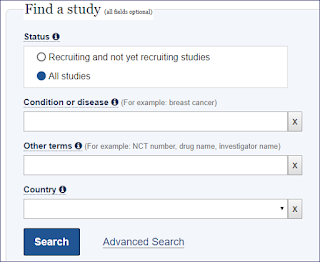Here’s an ugly truth – even though Clinical Trials need pwp
(and sometimes people without Parkinson’s), about 40% of these studies never publish
their findings* (this is true for all research there, not just for PD). Note that NIH and Michael J.
Fox Foundation, among others, make publication of results a requirement of
funding; wish all funders had such a requirement.
In all
cases, you’ll search in
Pubmed.gov,
a database of biomedical journal research articles from the US and the
international research community. Usually
a summary (called an abstract) of the article is available, with a link to the
entire article; sometimes the article itself is
free, but sometimes it’s behind a paywall (meaning you must pay the journal to
see the article).
You can search Pubmed
with keywords, just like Google. Why not just use Google? Because Google will give you many confusing records you'll need to weed through; Pubmed is easier For a
lot more about
usingPubmed, see this article.
1. The easiest way to look for a possible journal article is
to search for the NCT number (National Clinical Trial) on the
Pubmed.gov database, since some researchers refer to the NCT number in their papers.
Just enter the NCT number (found throughout the
ClinicalTrial.gov record) into the search field at Pubmed.gov as in the example above.
Here's an example of the start of an abstract that could result from such a search. You can see the link(s) to the full article on the right.
2 . Entering the NCT number didn’t work? Put
on your detective hat. From the Clinical
Trial record for this study, get the name of the Principal Investigator (scroll
down to the bottom of the Tab called Tabular View.) Then look for the title of the study (at the top); you may also have to read
the summary paragraph that explains what the study is about. From these, pull out what you think are the
important keywords – for example, name of drug or device or technique used.
In the Pubmed.gov database, in the search bar put the
keywords and the Principal Investigator’s name.
You may also need to add the term Parkinson. See the example below:
There may be nothing, or multiple
articles. If the title doesn’t tell you
enough to decide which is the right article, compare the Completion Date from ClinicalTrial.gov with the publication
date of the articles; the publication date is usually at or later than the
Completion Date; this was done in the example shown above, choosing the 2017 article because it comes a few months after completion.
3. If none of the papers deal with the clinical trial, there's one more place. Often you'll find an
email address associated with the Principal Investigator in the Clinical Trial
database, so you could email this person to ask about publication of results. There may be a paper that you didn’t find, or the paper may
be in the process of being published, so you don't want to assume they didn't publish. Here’s an example email: “I’ve been looking for the paper that
describes the results of NCT12345678. Title of Study. Can you help?” If they have a paper, they can
provide the link. If they don’t have a
paper, you may have managed to make them feel a bit embarrassed, all while
staying completely polite yourself, and not risking embarrassment. (Take the high road.)
4. By the way, if somebody gives you a
DOI number (used in
electronic publishing), go to
dx.doi.org,
enter the number in the search box, and you’ll go right to the summary and/or article.
(Google will give you confusing choices.)
5. If none of these work, you've struck one of the 40%. Studies that use US government money are required to publish their results. Shouldn't funders from companies, foundations, and universities require the same?
*Wyant, Kara J., Yasuda, Erica, Kotagal, Vikas. “The 10‐Year Landscape of United States‐Registered Parkinson Disease Clinical Trials: 2007–2016.” Movement Disorders, Wiley InterScience, 4 Oct. 2018, onlinelibrary.wiley.com/doi/abs/10.1002/mdc3.12665.













